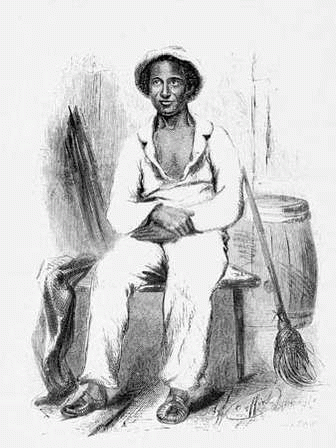I recently completed reading Twelve Years a Slave, the autobiography of a free Negro from New York who was drugged, kidnapped, and sold into slavery in 1841. Maybe we don't need these graphic reminders of the brutality with which slaves were routinely treated in America's ante-Bellum Deep South, but two things about Northup's account command our attention. First, his extraordinary erudition and fine writing style, in a man who had limited educational opportunity early in life, and who, prior to writing this volume, had not been permitted paper or pen for 12 years. Second, and more remarkable yet, is the generosity of spirit with which he regards the very men responsible for the whippings and deprivations that made his life a living hell. I can only compare him to Nelson Mandela, who so magnanimously forgave the men who held him a political prisoner for 27 years.
The existence of Slavery in its most cruel form among them, has a tendency to brutalize the humane and finer feelings of their nature. Daily witnesses of human suffering--listening to the agonizing screeches of the slave--beholding him writhing beneath the merciless lash--bitten and torn by dogs--dying without attention, and buried without shroud or coffin--it cannot otherwise be expected, than that they should become brutified and reckless of human life. It is true there are many kind-hearted and good men in the parish of Avoyelles--such men as William Ford [Northup's first owner, for a brief period]--who can look with pity upon the sufferings of a slave, just as there are, over all the world, sensitive and sympathetic spirits, who cannot look with indifference upon the sufferings of any creature which the Almighty has endowed with life. It is not the fault of the slaveholder that he is cruel, so much as it is the fault of the system under which he lives. He cannot withstand the influence of habit and associations that surround him. Taught from earliest childhood, by all that he sees and hears, that the rod is for the slave's back, he will not be apt to change his opinions in maturer years.There may be humane masters, as there certainly are inhuman ones--there may be slaves well-clothed, well-fed, and happy, as there surely are those half-clad, half-starved and miserable; nevertheless, the institution that tolerates such wrong and inhumanity as I have witnessed is a cruel, unjust, and barbarous one. Men may write fictions portraying lowly life as it is, or as it is not--may expatiate with owlish gravity upon the bliss of ignorance--discourse flippantly from arm chairs of the pleasures of slave life; but let them toil with him in the field--sleep with him in the cabin--feed with him on husks; let them behold him scourged, hunted, trampled on, and they will come back with another story in their mouths. Let them know the heart of the poor slave--learn his secret thoughts--thoughts he dare not utter in the hearing of the white man; let them sit by him in the silent watches of the night--converse with him in trustful confidence, of "life, liberty, and the pursuit of happiness," and they will find that ninety-nine out of every hundred are intelligent enough to understand their situation, and to cherish in their bosoms the love of freedom, as passionately as themselves.






